- Home
- Scott Turow
Innocent kc-8 Page 8
Innocent kc-8 Read online
Page 8
"Because anybody his age would know better. I don't think you score a lot of coffee dates off eharmony.com when you say in your profile, 'Once accused of murdering my mistress.'"
"I think that would turn some women on," said Rory.
"Why is it," Brand asked, "I never met those kind of women?"
"Anybody working here?" Tommy said. "Rory, how's it figure that Rusty's getting some? What came back on the subpoenas?"
"Actually, not much," said Rory. "We picked up his bank account number from his county payroll records. That was the best thing I got, his bank account."
Tommy asked if the bank had received the ninety-day letter ordering them not to talk. Rory gave him that look, I'm not stupid, then opened her file folder. Class began.
She handed out copies of Rusty's statements.
What Rory showed them over the next few minutes was that last April, Rusty had stopped the automatic deposit of his county check at his bank. That was just when a cost of living adjustment for the state judges had finally come through, after being held up more than two years by some cock-and-bull litigation by a taxpayers group. Instead of the electronic deposit, Rusty walked into the bank every two weeks with his paper check and deposited the same amount to the penny that had been going in before the COLA. He pinched off the remainder in cash, including more than four grand for the backlog paid to start.
Tommy wasn't getting the point.
"It means he wants some money the missus don't know nothing about," Rory said. Now and then she talked just like her old man, bad grammar and everything, as if she were sorry she'd been a Phi Beta Kappa.
Brand pointed at Molto. "Told you," said Jim. "The girl is good."
"No, I told you," said Tommy. "Only I'm not seeing how dollars equals dollies. Maybe the judge likes the ponies."
"Or crack," said Rory. "That was my first guess," she said, "since I'm just guessing." She gave Tommy another dark look. She was not letting him off easy. "Most of the cash, naturally, I can't tell you where it went. But I got a pretty good idea. Sometimes he'd come into the bank, make the deposit, and use the cash he was getting back, plus some extra he had in his sock, to buy cashier's checks."
"Nice get," said Tommy.
"Better lucky than good. The bank just coughed up the cashier's checks with the rest of the records. I never thought to ask. Usually with all the financial privacy laws, you gotta beat them like a drum just to get what you're entitled to. But they had it all in a package in less than a day. Probably the ninety-day letter gave them all a jolt. I don't think they see many of those out in Nearing."
She passed the first cashier's check around, dated May 14, 2007, for $250. It was made payable to a company called STDTC.
"Stands for?" asked Tommy.
"Sexually Transmitted Disease Testing Corporation."
"Whoa."
"Yeah, whoa," she said.
"Why's he got a dirty dick?" asked Tommy.
"Boy," said Rory, "I can give you a lot of theories. All of them fun. You already shot down the first one. Maybe he forgot his raincoat. Maybe the girlfriend and him wanted to go naked and were holding hands in the waiting room while they tested together. Obviously, though, if he brought something home, he wouldn't get too far with the missus telling her he got it off a toilet seat."
"Can we get the results?" Tommy asked Brand.
"Only if we ask the feds. Under the Patriot Act, they can get your medical info without you knowing. But the state assembly nixed that on the local version."
The feds would steal the case if they could. Chief judge. Supreme court. They always wanted everything that would make headlines above the fold. But Tommy didn't really need them. The bare fact that Rusty tested meant he'd been roving.
Tommy looked at Brand. "Maybe Rusty's girl's a pro?"
Brand waggled his head. It was a theory.
"Maybe he got some names from Eliot Spitzer," Jim said. They all laughed, but Rory wasn't buying that, because hookers were usually a habit, and Rusty had started depositing his whole paycheck, including the COLA, as of June 15 last year.
"How'd he explain that to the old lady?" Brand asked her.
"Tells her the COLA finally came through."
Brand nodded. So did Tommy.
"Assuming he wanted the cash to keep some girl, that must have stopped," Rory said. "At least for a while."
"Why only for a while?" asked Brand.
"Here's cashier's check number two."
The check, dated September 12, only a little more than a month ago, was made payable to Dana Mann for $800. The memo on it said, "9/4/08 Consultation." Prima Dana, as he was known, was the king of the high-end divorce bar, representing the rich and the richer. The street rap made him a preening jerk, cagier than he was smart, whose main skill was doing the United We Stand routine with grieving divorcees, but there were also some who credited his tact and judgment, and Rusty apparently was one of them.
"So how are you figuring this?" Tommy asked her.
"You mean why did he pay for a consultation?"
"No," said Tommy. He could explain that much. Prima Dana was up in the court of appeals all the time. If Rusty was sticking with Barbara and not becoming Dana's client, then as long as Rusty had settled Dana's bill, the judge didn't have to take himself off Dana's future cases, a move that otherwise would be as good as a public announcement that he had been thinking about divorce at some point.
"Divorce would be a little tough in the middle of a campaign," Brand said.
"Especially if there was another woman," said Tommy.
"Can we get Prima Dana's records?" Rory asked.
Tommy and Brand both shook their heads.
"Nothing but the bill and the payment," Tommy answered. "He'd never tell us what they discussed. It's privileged. Not that it's worth the bother. How many times in the last decade has Prima Dana filed an appearance in anything but a divorce case?"
Brand went to Tommy's computer. Jim was one of those guys who understood computers as though he'd been born inside the machine and could seemingly extract information by touching a couple of keys, all in the time it took Tommy to remember how to open his e-mail program.
"'Practice limited to matrimonial law,'" Brand read off Prima Dana's website.
Rory had another cashier's check to Prima Dana in July 2007 with a similar notation. So apparently Rusty had been lingering with the idea of divorce for a while. The earlier occasion correlated pretty well to the times he'd been seen traipsing around with his young honey.
"So how are you putting this together?" Tommy asked Rory.
Rory shrugged. "My way back machine got broke. Could be a lot of things, but you know, pretty for sure he had a girl. After that, we can just spitball. We all know the usual: She told him to cut the missus loose or the store was closed, he wouldn't, they split, and by this September he was having second thoughts. He was getting ready to bail. Then," said Rory with a little dramatic trill, "Mrs. Judge very conveniently passed away instead." She looked at Tommy, then Brand. Of course she'd figured it out. Of course. This girl was good. Rusty's second check to Prima Dana was less than three weeks before Barbara had died.
"Nothing," said Tommy, pointing at her. "Not even to Phil."
Over her lips, she did a lightning version of the lock and tossed key.
Tommy weighed it out. There could be a lot of other explanations, but that one was pretty good.
"Do we know who this girl is?" he asked.
Rory took a beat. "I was thinking maybe the big boys had a clue."
"We're SOL on that," said Tommy.
Rory was, too. Records of the landline phones were sixed by now, and the cell phone detail showed a few calls every day, but almost all to his house or his son or the drugstore in town.
She smiled. "We could subpoena the court's telephone records. But it kind of seems like the ninety-day letter has got to go to the chief judge. And the detail, a year and a half later, has got to be trashed now, too, just like the other
phones."
"E-mail?" asked Brand.
"These days every provider purges their server after thirty days. That doesn't mean he don't have messages on his own hard drives. I think it'd be especially interesting to take a look at his computer at home. Or at work."
"We're not going there right now," Tommy said. "Not before the election. And not without more than we have."
Tommy thanked Rory, laying it on thick about the kind of job she'd done.
"I'm on this?" she asked from the door, meaning she would be the cop who got the collar, if there ever was one.
"You're on it," said Tommy. "Wouldn't want nobody else. We'll call you."
Brand and Tommy sat alone. You could hear the phones chirping and deputies yelling at one another in the hall.
"We got something, Boss. The STD test-that's not for the happily monogamous. And we know he's talking about ending the marriage just a few weeks before she checks out."
Tommy thought. "Maybe Barbara was having the affair," he said. "Maybe he's paying a PI with the COLA and it's the investigator he's meeting in the hotel, who by the way is a young woman, which is damn good cover for a PI. Maybe he tests to be sure his wife hadn't brought home the nasty. Over time he can't forgive her, so he goes to commune with Prima Dana."
Brand ripped out a wild laugh. "You really missed your calling, you know. You'd have been a whiz on the other side, Boss. You have the head for it."
"But not the stomach," answered Tommy. "Look, Jimmy. The coroner says Barbara died of natural causes."
"Because the bad judge sat for twenty-four hours to wait for whatever really killed her to dissolve in her gut." Brand came around Tommy's desk. "We gotta surface, Boss." Brand had a whole long list of things to do. Get Rusty's computers. Do interviews to see how Rusty and Barbara were getting along, and develop a minute-by-minute timeline on what happened the night before Barbara died. Talk to the Sabiches' kid.
"Not yet," Tommy answered. "It hits the press, Rusty loses the election. Rusty loses the election and we made his defense, no matter what kind of evidence we come up with eventually. You know this song, every word: 'Acting PA wants revenge for old case, keeps Sabich off court.' We take our time, we don't have to listen to that."
"They serve ten-year terms on the supreme court," said Brand.
"Not with a murder conviction," Tommy answered.
"And what if we come up short?" asked Brand. "We get close but not close enough. This guy not only strolls on murder again, but is up there beating on us."
Tommy knew all along that Brand would get to this: Let it leak and put Rusty's lights out. Do a little justice instead of none at all. In the heat of the moment, Brand was still inclined to cut corners now and then. Tommy had probably been the same way, if he was going to be honest, and without the same excuse. Brand's father keeled over dead at his desk at National Can when Brand was eight. There were five other kids. The mom did what she could, became a teacher's aide, but they were trapped in a strange existence, residing in a nice suburban house paid off by the dad's mortgage insurance, in a town where they couldn't afford to live. Brand went through school with everybody around him having more-better clothes, vacations, cars, meals. These days, Brand did a lot of gourmet cooking-he and Jody got together every month with three other couples and tried their hand at stuff they'd seen on Iron Chef. A few years ago, Tommy asked Jim offhandedly what got him interested in food.
'Being hungry,' Brand answered. He wasn't talking about mealtimes these days, Tommy realized. The Brand family wanted in a community where nobody even understood the concept. Stuck in the middle, Brand always felt nobody in his house had time for him. His mom had twins, five years younger than Jim, to concentrate on. His older brothers were both doing what they could to hold things together for the rest of the brood.
In high school, Brand was in trouble all the time-cutting school, hanging out at poker parlors, where he started playing on the sly when he was fifteen. They'd have tossed him out if it hadn't been for football. Brand was a savage on the field. But their savage. He probably ended the seasons of four or five teammates during practice and twice the number of opponents, but he was all-conference and rarely missed a tackle in the open field. They told him he wasn't big enough to play linebacker in Division I, but he changed their minds when he got to the U. He made it the same way he did here, when Tommy got him the chance, on sheer will. That in turn was why Brand loved Tommy: because Tom was the first person in Jim's life who he felt cut him a real break without something to gain for himself. But when you turned up the heat at moments, particularly at trial, the hungry, pissed-off kid was still there, who didn't like playing by the rules because he thought they were made by people who didn't give a fig about the likes of him. Sooner or later, the grown-up took over. Brand always came back to himself, but sometimes you had to kick him in the ass. And Tommy did that now.
"No," said Tommy to the idea of a leak, with just enough irritation to make the point. He had learned this lesson the hard way years ago with the first Sabich case. You're here to prosecute crimes, not decide elections. Just do the job. Investigate. Build a case. Try it. The fallout was not your concern. "No choice. Nothing public before the election."
Brand didn't like it. "Besides," he said.
There was always a "besides" with Jimmy. He thought long and hard before he saw the boss.
"We got another way to deal with all of this," Brand said. "Punch a hole in that vendetta defense."
"Which is?"
"Prove he got away with murder twenty years ago. The PA isn't looking for revenge. He's looking for justice. The blood standards and the sperm fraction from the old case have still got to be in the police pathologist's deep freeze, don't they?"
Tommy knew where this was going because he had considered the possibility a couple of times a year for the past decade, once he realized that DNA would provide a definitive answer about whether Sabich was guilty of Carolyn Polhemus's murder. Of course, he'd never had a decent reason to do the tests.
"Not yet," he said.
"We could go in for an ex parte court order. Say it's part of a grand jury investigation."
"You pull that evidence out of the deep freeze at McGrath," he said, referring to police headquarters, where no secret was safe, "especially with a grand jury court order, and every cop in town will know in two hours, and every reporter about five minutes after that. When it's time, there may be a way without a court order."
Brand stared. This was the first time Tommy actually betrayed himself, showed how much thought he'd given to Rusty-and the DNA.
"Not yet," said Tommy. "After the election we can look at all of this again."
Brand was frowning.
"Not yet," Tommy repeated.
CHAPTER 9
Rusty, May 2007
What is great sex? Does it have to be prolonged? Or inventive? Are circus maneuvers required? Or merely intensity? By whatever measure, my bouts with Anna are not the greatest of my life-that title will forever rest with Carolyn Polhemus, for whom sex on each occasion was a shameless conquest of the most extreme altitudes of physical pleasure and lack of inhibition.
Anna is of a generation for many of whom sex is first and foremost fun. When I knock on the hotel room door ten minutes behind her, there is often an amusing surprise: A nurse in six-inch come-fuck-me heels. Her torso wrapped in Saran. A green arrow in body paint that plunges between her breasts and joins a V immediately above the female cleft. The gift bow tying her robe, beneath which she was naked. But the humor sometimes implies a lack of consequence I never feel.
She is, of course, far more experienced than I. Anna is the fourth woman I have slept with in the last forty years. Her "number," as she blithely refers to it, is never disclosed, but she mentions enough in passing that I know my predecessors are many. I am concerned, therefore, when it develops that she has trouble reaching climax. With apologies to Tolstoy, I would say that all men come alike, but each woman arrives at orgasm her own way-and
Anna's way often eludes me. There are days when I have my own problems, finally leading me to call on my doctor for the little blue pill he's often offered.
But for all that might, at moments, seem to make Anna and me candidates for an instructional video, there is an inescapable and wondrous tenderness every time we are together. I touch her the way you would a holy relic-adoringly, lingering with the certainty that my yearning and my gratitude are radiating from my skin. And we have the one thing that great lovemaking always requires-in our best moments, nothing else exists. My shame or anxiety, the cases that vex me, my concerns about the court and the campaign-she is the only thing in the known universe. It is a beautiful, perfect oblivion.
No matter how much Anna insists that we should not consider our ages, the difference is there constantly, especially in the gap it creates in our communications. I have never held an iPod, and I do not know whether it is good or bad when she says that something "kills." And she has no clue about the world that made me, no memories of Kennedy's assassination or life under Eisenhower-not to mention the sixties. The great fusion of love, the sense that she is I and I she, is sometimes subject to question.
It also means that I talk too often about Nat. I cannot resist asking Anna's assistance, as someone who is far closer to him in life.
"You worry too much about him," she tells me one night as we are lying in each other's arms between bouts. Room service will knock soon with dinner. "I know a lot of people who went to law school with him at Easton and they all say he's brilliant-you know, one of those people who talk in class only once a month and then say something even the professor never thought of."
"He's had a hard time. There's a lot going on with Nat," I say.
Because you love your children, and make their contentment the principal object of your existence, it's something of a downer to see them turn out not much happier than you. Nathaniel Sabich was a good kid by most common measures. He paid attention in grade school, he dissed his parents with relative infrequency. But he had an uncommonly hard time growing up. He was a rambunctious little boy, who had trouble sitting still and paged ahead to see the end when I was reading him a story. As he grew older, it became plain that all the random motion had its source in a kind of worry he took deeper and deeper into himself.

 Testimony
Testimony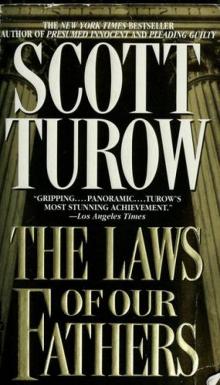 The Laws of Our Fathers
The Laws of Our Fathers Ordinary Heroes
Ordinary Heroes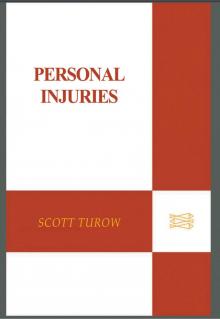 Personal Injuries
Personal Injuries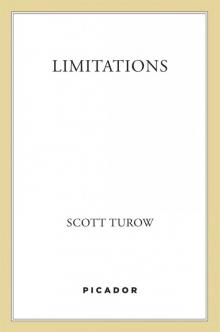 Limitations
Limitations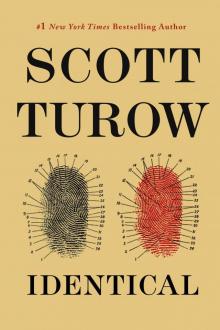 Identical
Identical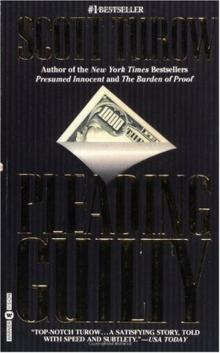 Pleading Guilty
Pleading Guilty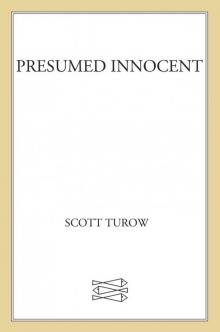 Presumed Innocent
Presumed Innocent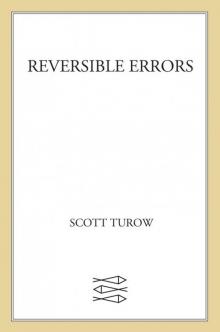 Reversible Errors
Reversible Errors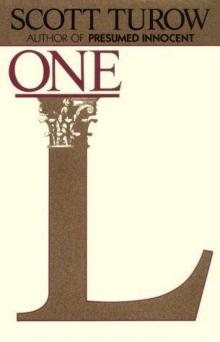 One L: The Turbulent True Story of a First Year at Harvard Law School
One L: The Turbulent True Story of a First Year at Harvard Law School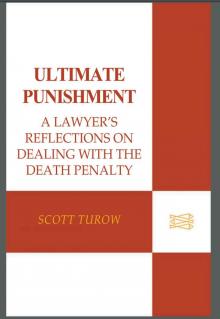 Ultimate Punishment
Ultimate Punishment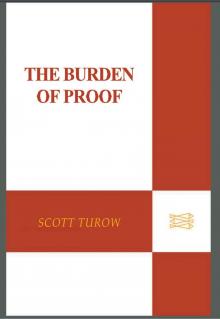 The Burden of Proof
The Burden of Proof Ordinary Heroes (2005)
Ordinary Heroes (2005)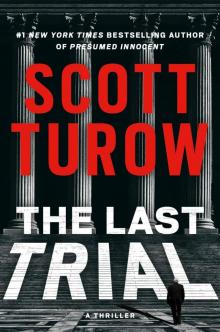 The Last Trial
The Last Trial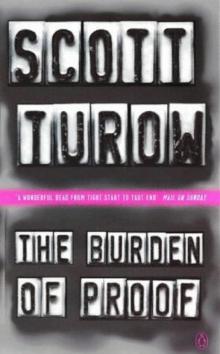 The Burden of Proof kc-2
The Burden of Proof kc-2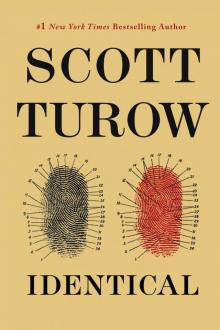 KC09 - Identical
KC09 - Identical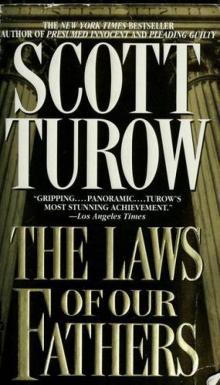 The Laws of our Fathers kc-4
The Laws of our Fathers kc-4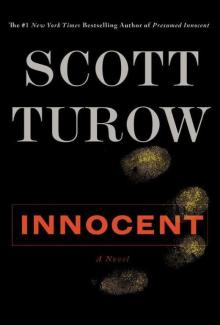 Innocent kc-8
Innocent kc-8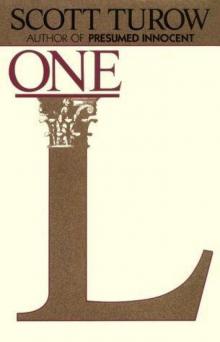 One L
One L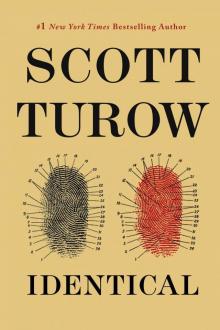 Identical kc-9
Identical kc-9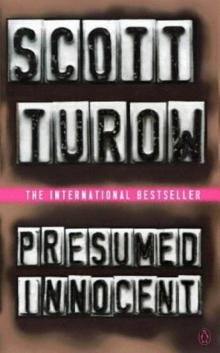 Presumed innocent kc-1
Presumed innocent kc-1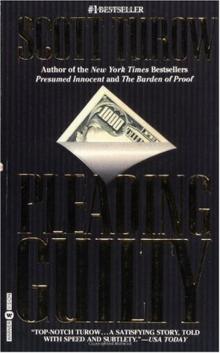 Pleading Guilty kc-3
Pleading Guilty kc-3 One L (1977)
One L (1977)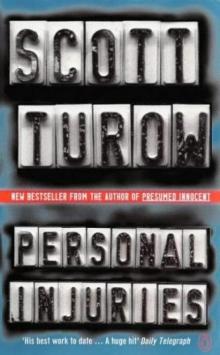 Personal injuries kc-5
Personal injuries kc-5